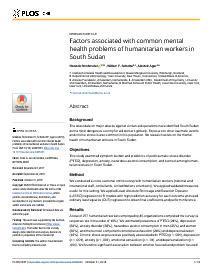Factors associated with common mental health problems of humanitarian workers in South Sudan
Background
The latest data on major attacks against civilian aid operations have identified South Sudan as the most dangerous country for aid workers globally. Exposure to other traumatic events and chronic stress is also common in this population. No research exists on the mental health of humanitarian workers in South Sudan.
Objectives
This study examined symptom burden and predictors of posttraumatic stress disorder (PTSD), depression, anxiety, hazardous alcohol consumption, and burnout among humanitarian workers in South Sudan.
Method
We conducted a cross-sectional online survey with humanitarian workers (national and international staff, consultants, United Nations volunteers). We applied validated measures useful for this setting. We applied Least Absolute Shrinkage and Selection Operator (LASSO) regression to fit models with high prediction accuracy for each outcome and used ordinary least squares (OLS) regression to obtain final coefficients and perform inference.
Results
A total of 277 humanitarian workers employed by 45 organizations completed the survey (a response rate in the order of 10%). We estimated prevalence of PTSD (24%), depression (39%), anxiety disorder (38%), hazardous alcohol consumption in men (35%) and women (36%), and the burnout components emotional exhaustion (24%) and depersonalization (19%). Chronic stress exposure was positively associated with PTSD (p < .001), depression (p < .001), anxiety (p < .001), emotional exhaustion (p < .01), and depersonalization (p < .001). We found no significant association between emotion focused and problem focused coping and mental health outcomes. Associations between dysfunctional coping and depression (p < .001) and anxiety (p < .01) were positive. Higher levels of spirituality were associated with lower risk of hazardous alcohol consumption (p < .001). Contrary to expectations, working directly with humanitarian aid beneficiaries was significantly associated with lower risk for emotional exhaustion (p < .01).
Conclusion
Our results suggest that humanitarian workers in South Sudan experience substantial levels of mental ill-health. This study points to the need for staff support strategies that effectively mitigate humanitarian workers’ chronic stress exposure. The dynamics between coping and mental health among humanitarian workers require further study.
In: PloS one, eISSN 1932-6203 | 13 | 10 | e0205333
https://doi.org/10.1371/journal.pone.0205333


